Animal Farm is a classic novel by George Orwell that tells the story of a group of farm animals who rebel against their human farmer in hopes of creating a society where the animals can be free and live in harmony. However, the pigs, who take on leadership roles, become corrupted by power and ultimately become just as oppressive as the humans they overthrew.
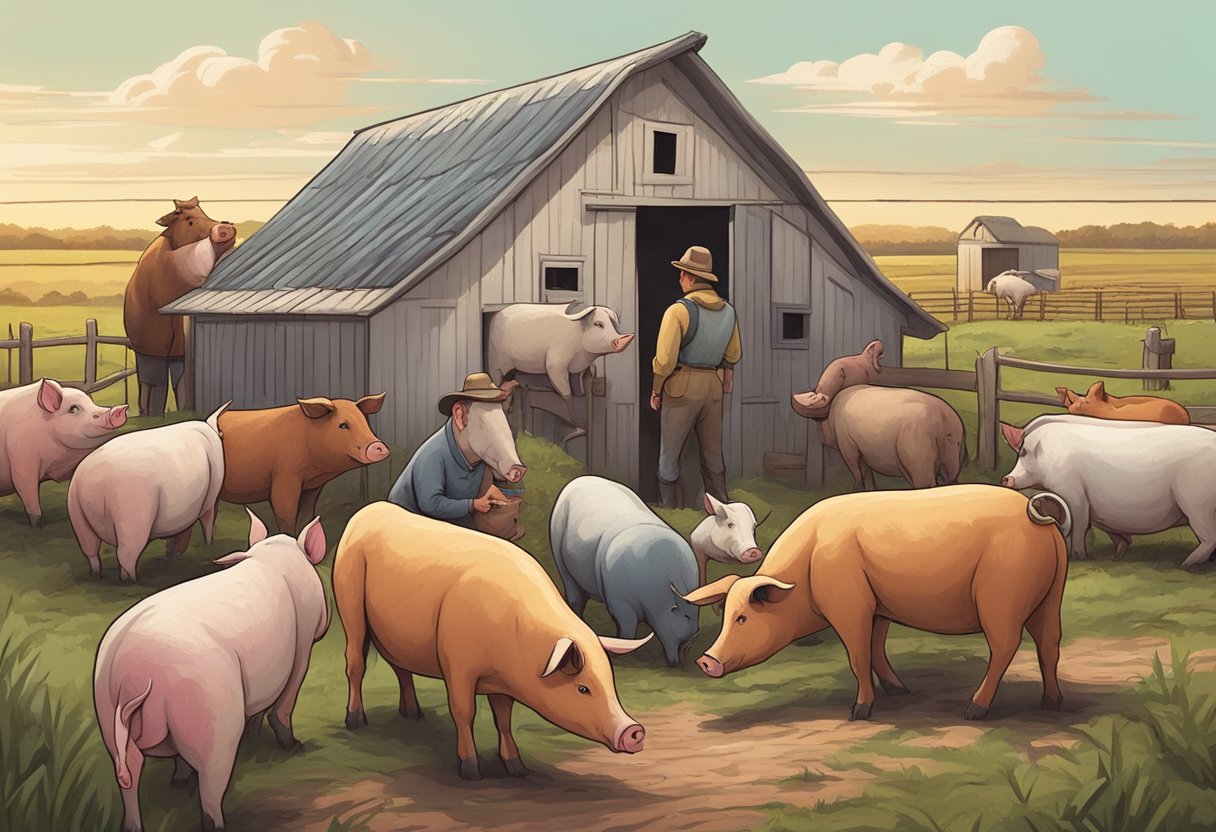
At its core, Animal Farm is an allegory for the Russian Revolution and the rise of Stalinism. The characters and events in the novel represent real-life people and events from this time period, with the pigs representing the ruling class and the other animals representing the working class. By using animals to tell this story, Orwell is able to comment on the dangers of political corruption and the importance of maintaining a just and equal society.
Throughout the novel, Orwell uses symbolism and allegory to convey his message. For example, the character of Napoleon represents Joseph Stalin, while Snowball represents Leon Trotsky. The use of these characters and their actions to represent real-life events and people helps to make the novel more accessible and relatable to readers, while also allowing Orwell to make pointed criticisms of the political systems of his time.
Background of Animal Farm
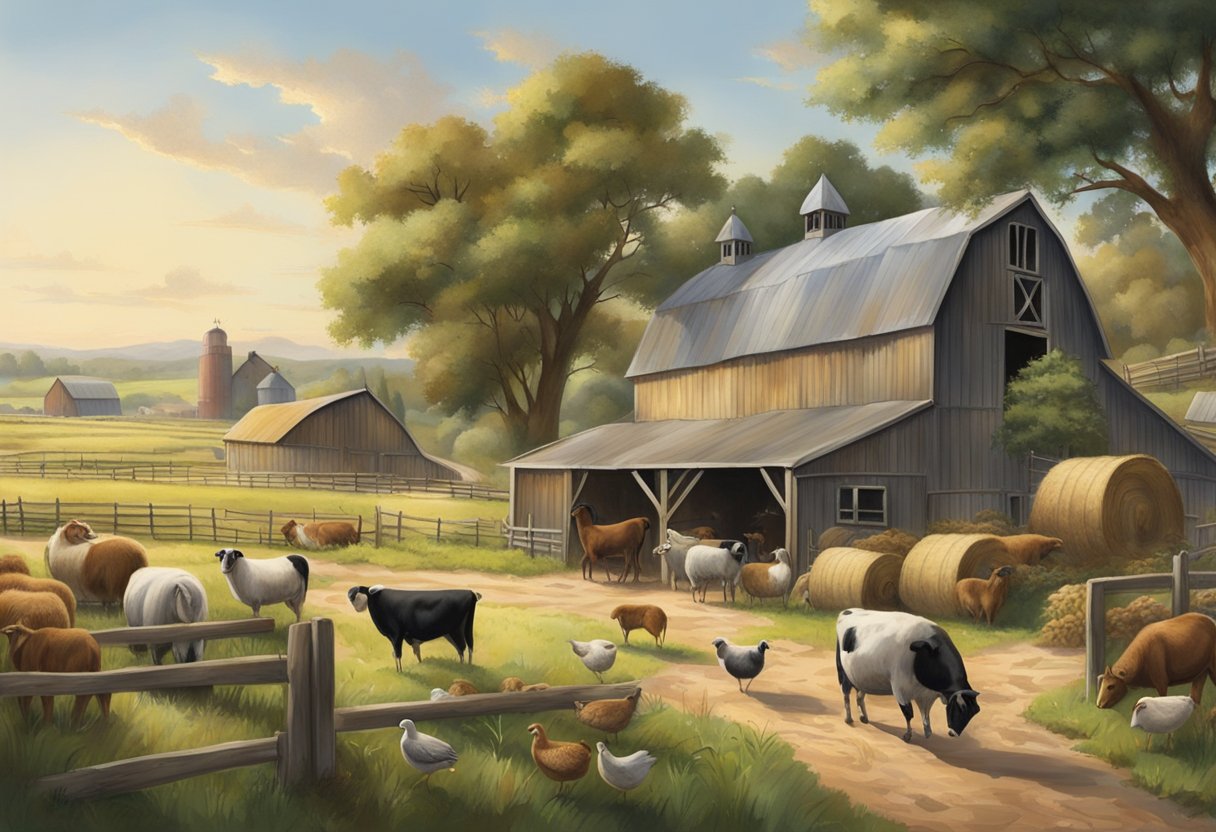
Authorship by George Orwell
Animal Farm is an allegorical novella written by George Orwell, published in 1945. George Orwell, whose real name was Eric Arthur Blair, was an English writer and journalist. He is best known for his two dystopian novels, Animal Farm and 1984, which are considered some of the most influential works of the 20th century. Orwell was known for his political and social commentary, and his works often reflected his experiences and observations of the world around him.
Historical Context
Animal Farm was written during a time of great political upheaval in Europe. The novella was published just after the end of World War II, a time when many countries were grappling with the aftermath of the war and the rise of totalitarian regimes. In particular, Orwell was critical of the Soviet Union and its leader, Joseph Stalin, who he believed had betrayed the ideals of the Russian Revolution and become a dictator.
Publication and Reception
Animal Farm was first published in England on August 17, 1945. The novella was an immediate success, and it has since become one of the most widely read and studied works of the 20th century. The book has been translated into more than 70 languages and has sold millions of copies worldwide. Despite its popularity, Animal Farm has also been the subject of controversy and censorship, particularly in countries with authoritarian governments.
Plot Overview
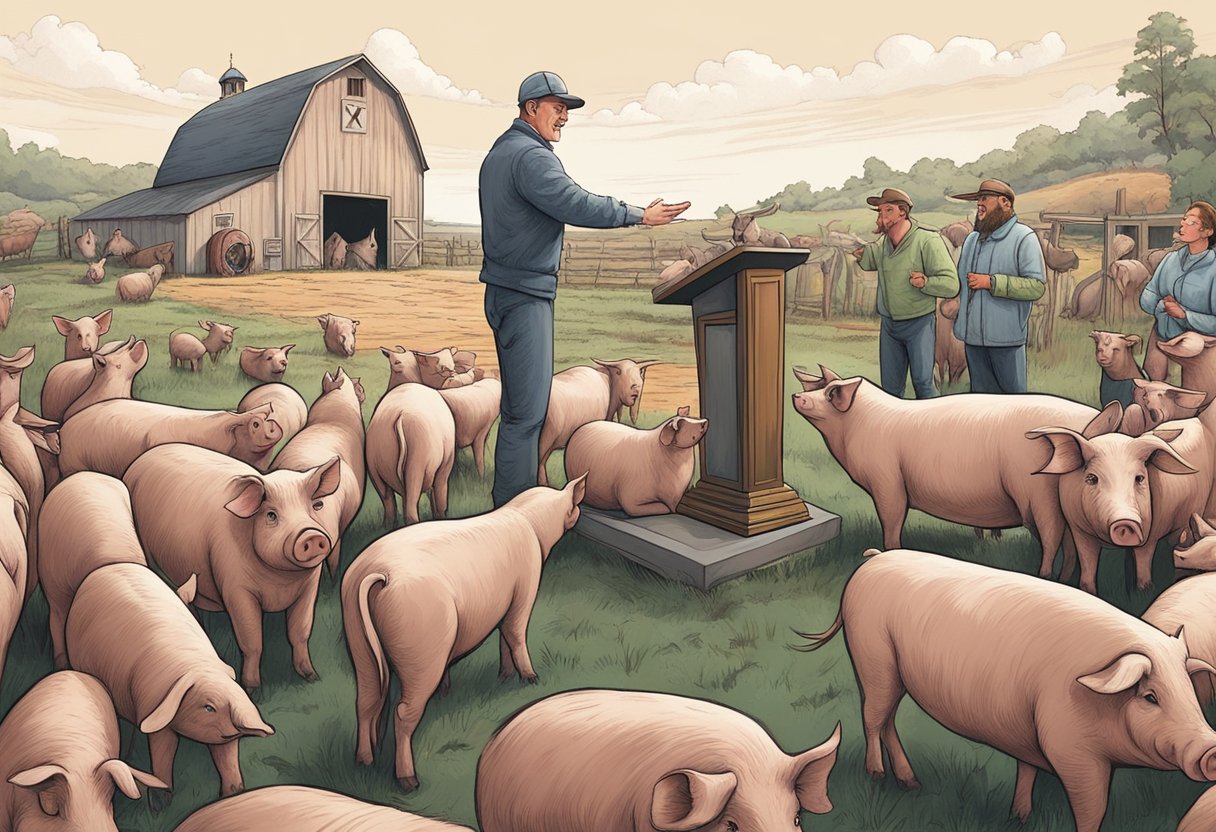
Main Events
Animal Farm is an allegorical novel by George Orwell, published in 1945. The book tells the story of a group of farm animals who rebel against their human farmer, hoping to create a society where the animals can be equal, free, and happy. The story takes place on a farm in England, and the animals are led by two pigs named Snowball and Napoleon. The main events of the story are as follows:
- The animals overthrow Mr. Jones, the farmer, and rename the farm “Animal Farm”
- Snowball and Napoleon emerge as leaders of the animals
- The pigs begin to take control of the farm and establish themselves as the ruling class
- Snowball is chased off the farm by Napoleon’s dogs, leaving Napoleon in complete control
- Napoleon becomes increasingly corrupt and authoritarian, using violence and propaganda to maintain his power
- Boxer, a loyal horse, is sent to the glue factory when he is no longer useful to Napoleon
- The pigs become indistinguishable from the humans they had rebelled against, and the other animals realize that they have been betrayed
Key Characters
There are several key characters in Animal Farm, each representing a different aspect of the Russian Revolution and its aftermath. Some of the most important characters are:
- Old Major: A wise old pig who inspires the animals to rebel against their human oppressors
- Snowball: A pig who is a skilled speaker and idealistic leader, but is chased off the farm by Napoleon’s dogs
- Napoleon: A pig who becomes increasingly authoritarian and corrupt, using violence and propaganda to maintain his power
- Boxer: A loyal horse who works tirelessly for the good of the farm, but is ultimately betrayed by Napoleon
- Squealer: A pig who serves as Napoleon’s propaganda minister, using lies and half-truths to manipulate the other animals
Overall, Animal Farm is a powerful allegory that uses the story of a group of farm animals to explore the rise of totalitarianism in the Soviet Union and the dangers of political power.
Allegorical Significance
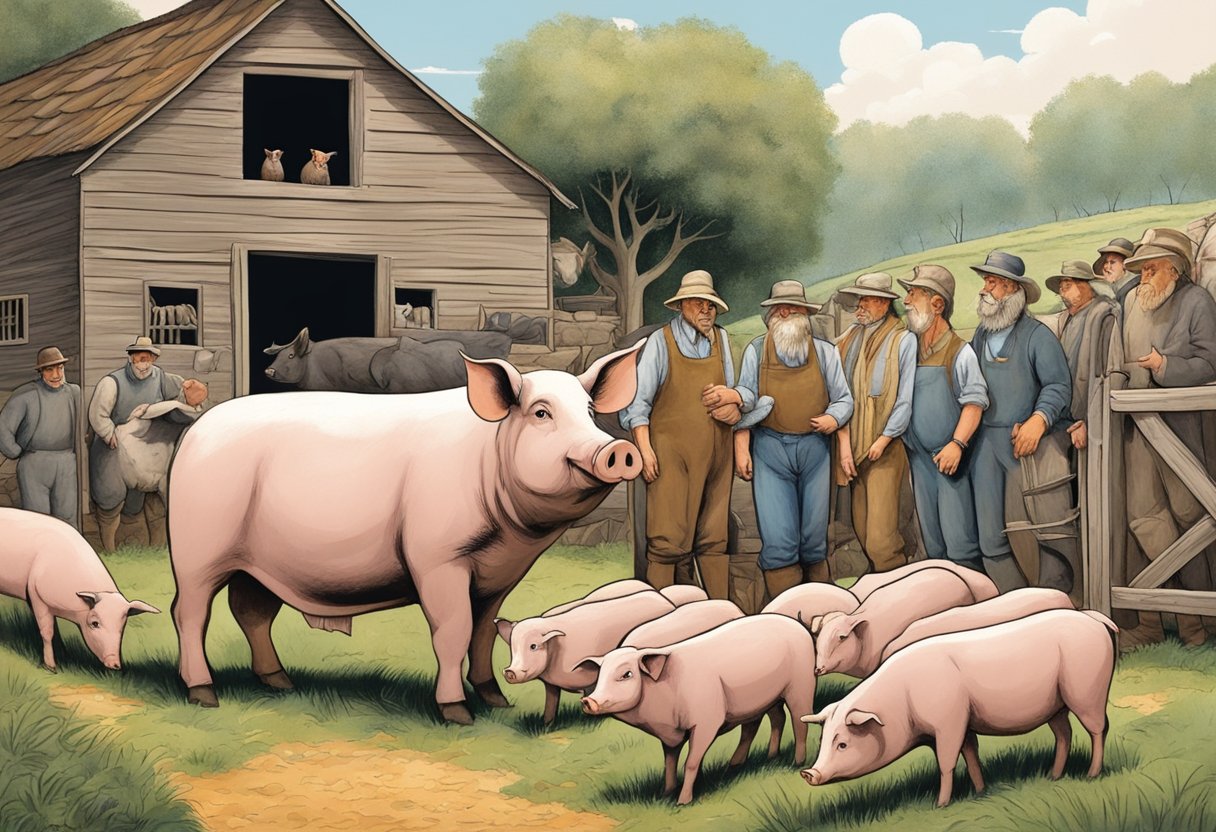
Animal Farm, written by George Orwell, is a political allegory that uses animals to represent historical figures and events. The novel explores themes of totalitarianism, propaganda, and the corruption of ideals. The allegory is significant in its representation of the Russian Revolution, Stalinism vs. Trotskyism, and the dangers of totalitarianism and propaganda.
The Russian Revolution
Animal Farm is an allegory for the Russian Revolution, with the animals representing historical figures such as Leon Trotsky, Joseph Stalin, and Vladimir Lenin. The novel explores the events leading up to the revolution, as well as the aftermath and the rise of Stalinism. The pigs, who represent the Bolsheviks, initially work towards a socialist society, but eventually become corrupt and oppressive.
Stalinism vs. Trotskyism
The novel also explores the conflict between Stalinism and Trotskyism. Napoleon, the main pig, represents Stalin, while Snowball represents Trotsky. The two pigs have different ideas about how the farm should be run, with Snowball advocating for a more democratic approach and Napoleon favoring a more authoritarian regime. Napoleon eventually wins out, banishing Snowball and becoming a dictator.
Totalitarianism and Propaganda
Animal Farm also explores the dangers of totalitarianism and propaganda. The pigs use propaganda to manipulate the other animals, convincing them that their actions are in their best interest. The pigs also establish a totalitarian regime, using violence and intimidation to maintain their power. The novel serves as a warning about the dangers of totalitarianism and propaganda, and the need for vigilance in protecting democratic ideals.
Themes and Motifs
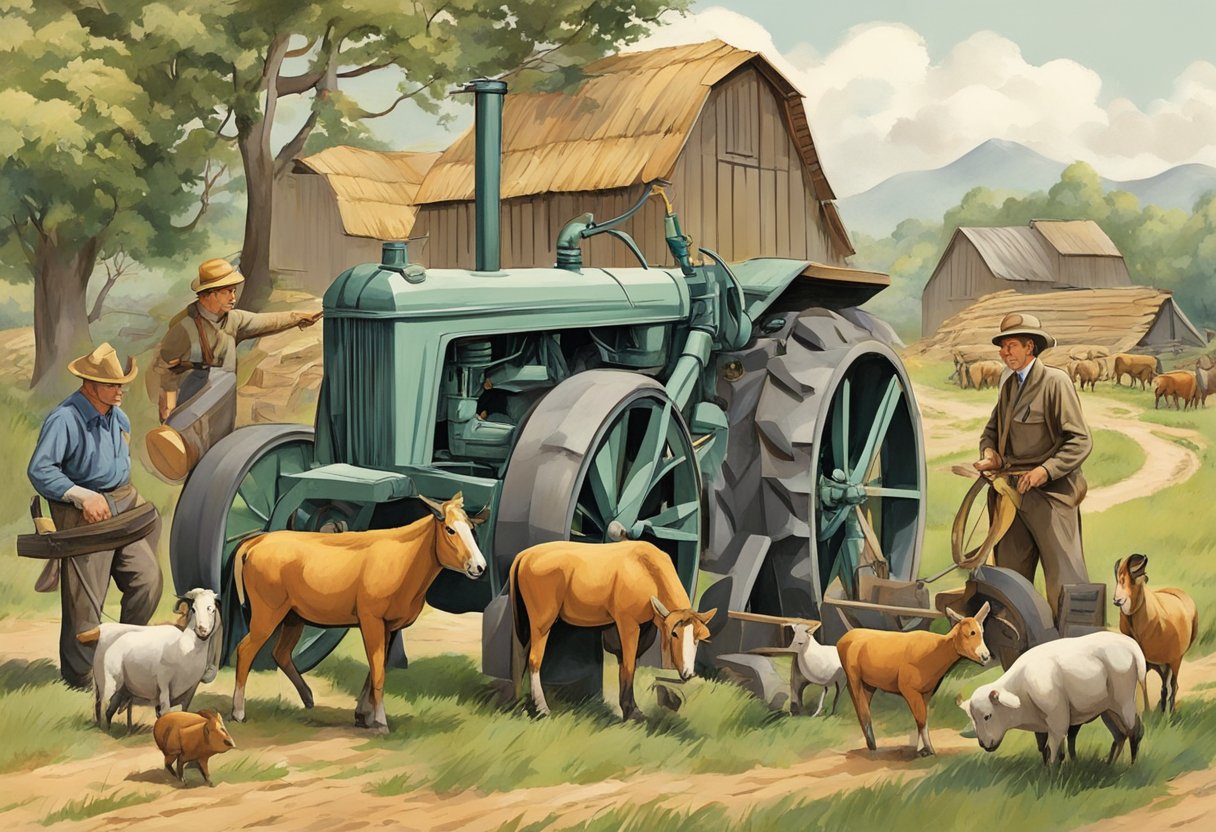
Power and Corruption
Animal Farm is a political allegory that illustrates the corrupting nature of power. The pigs, who initially lead the rebellion against the human farmer, soon become corrupt and oppressive rulers themselves. They use propaganda and manipulation to maintain their power, and they modify the rules of Animalism to suit their own interests. As a result, the animals on the farm become increasingly oppressed, and the pigs become increasingly tyrannical.
The Illusion of Utopia
Animal Farm portrays the idea that utopian societies are impossible to achieve. The animals initially believe that they can create a perfect society in which all animals are equal, but they soon realize that this dream is unattainable. The pigs, who become the ruling class, create a society that is even more oppressive than the one that they overthrew. The novel suggests that any attempt to create a utopia is doomed to fail because of the corrupting influence of power.
Class Warfare
Animal Farm is a commentary on the class struggle between the working class and the ruling class. The animals on the farm represent the working class, while the pigs represent the ruling class. The novel illustrates how the ruling class uses propaganda and manipulation to maintain their power and control over the working class. The novel suggests that the only way to achieve true equality is through a revolution that overthrows the ruling class and creates a society in which all individuals are equal.
Overall, Animal Farm is a powerful allegory that explores themes of power, corruption, the illusion of utopia, and class warfare. The novel suggests that any attempt to create a perfect society is doomed to fail because of the corrupting influence of power. The novel also illustrates how the ruling class uses propaganda and manipulation to maintain their power and control over the working class.
Character Analysis
Napoleon
Napoleon is a large pig and one of the main characters in Animal Farm. He is known for his intelligence, ambition, and ability to manipulate others. As the story progresses, Napoleon becomes increasingly tyrannical and corrupt, using his power to oppress the other animals and maintain his own authority. He is often compared to Joseph Stalin, the former leader of the Soviet Union, due to his ruthless tactics and disregard for the well-being of his subjects.
Snowball
Snowball is another pig and one of the leaders of the animal revolution. He is intelligent, passionate, and eloquent, and he believes in the principles of Animalism. However, he is eventually driven out of the farm by Napoleon and his supporters, who view him as a threat to their power. Snowball is often compared to Leon Trotsky, a Russian revolutionary who was exiled by Stalin and eventually assassinated.
Boxer
Boxer is a loyal and hardworking horse who plays a key role in the revolution. He is known for his strength and his motto, “I will work harder.” Despite his loyalty to the cause, Boxer is eventually betrayed by the pigs and sent to the knacker’s yard to be slaughtered. Boxer represents the working class, who are often exploited by those in power.
Squealer
Squealer is a small, persuasive pig who serves as Napoleon’s chief propagandist. He is skilled at manipulating language and convincing the other animals to accept Napoleon’s authority. Squealer represents the role of propaganda in maintaining a dictatorship, and the power of language to influence public opinion.
Overall, the characters in Animal Farm represent different aspects of the Soviet Union and the Russian Revolution. By examining their actions and motivations, readers can gain a deeper understanding of the dangers of totalitarianism and the importance of individual freedom and democracy.
Literary Devices
Symbolism
One of the most prominent literary devices used in Animal Farm is symbolism. The novel is an allegory, and the characters, events, and settings all represent something else. For example, the pigs represent the Communist Party leaders, while the other animals represent the working class. The farm itself represents the Soviet Union. The use of symbolism helps to convey complex ideas and themes in a way that is easy for readers to understand.
Irony
Irony is another literary device that is used throughout Animal Farm. One example of irony is when the pigs, who were once oppressed by Mr. Jones, become the oppressors themselves. This is ironic because they were fighting for freedom and equality, but end up becoming just as bad as their former oppressor. Another example of irony is when the pigs change the commandment “All animals are equal” to “All animals are equal, but some animals are more equal than others.” This is ironic because it goes against the very idea of equality that the animals were fighting for.
Foreshadowing
Foreshadowing is also used in Animal Farm to hint at events that will happen later in the novel. For example, the animals are warned about the danger of the pigs becoming too powerful early on in the novel. This foreshadows the pigs’ eventual rise to power and their abuse of that power. Another example of foreshadowing is when the pigs start to walk on two legs, which is a clear sign that they have become more like humans than animals. This foreshadows the pigs’ eventual transformation into human-like oppressors.
Overall, the use of literary devices in Animal Farm helps to convey complex ideas and themes in a way that is easy for readers to understand. Symbolism, irony, and foreshadowing are just a few of the devices used throughout the novel to convey the message that power corrupts, and that revolutions can often lead to new forms of oppression.
Critical Interpretations
Political Readings
Animal Farm has been interpreted in various ways, but one of the most common interpretations is that it is a political allegory. The novel is seen as a critique of the Soviet Union and its communist government. The pigs, who are the leaders of the animal revolution, are often seen as a representation of the Soviet leadership, with Napoleon being compared to Joseph Stalin and Snowball to Leon Trotsky. The novel highlights the dangers of totalitarianism and the need for a society that values freedom and equality.
Moral and Ethical Discussions
Apart from the political interpretations, Animal Farm has also sparked moral and ethical discussions. The novel raises questions about the nature of power and the corrupting influence it can have on individuals and societies. The pigs, who initially fight for animal rights, eventually become corrupt and oppressive, demonstrating the dangers of unchecked power. The novel also explores the importance of language and propaganda in shaping public opinion and controlling the masses.
Overall, Animal Farm is a thought-provoking novel that raises important questions about politics, power, and morality. Its enduring popularity is a testament to its relevance and the timeless nature of its themes.
Influence on Literature and Popular Culture
Adaptations
Since its publication, Animal Farm has been adapted into various forms of media, including films, stage plays, and even a video game. The most notable adaptation is the 1954 animated film produced by Halas and Batchelor, which remains a classic to this day. The film stays true to the book’s allegorical nature and serves as an excellent introduction to the story for younger audiences.
In addition to the film, there have been numerous stage adaptations of Animal Farm, including a 1984 production by the Royal Shakespeare Company. The play was well-received and praised for its ability to capture the essence of the book’s political commentary.
Cultural References
Animal Farm has had a significant impact on popular culture, with references to the book appearing in various forms of media. One notable example is the song “Pigs (Three Different Ones)” by Pink Floyd, which was inspired by the book’s themes of corruption and greed.
The book has also been referenced in various television shows, including The Simpsons and South Park. These references often serve as a commentary on current political events and draw parallels to the book’s portrayal of totalitarianism.
Overall, Animal Farm’s influence on literature and popular culture is a testament to its enduring relevance and ability to provoke thought and discussion.

